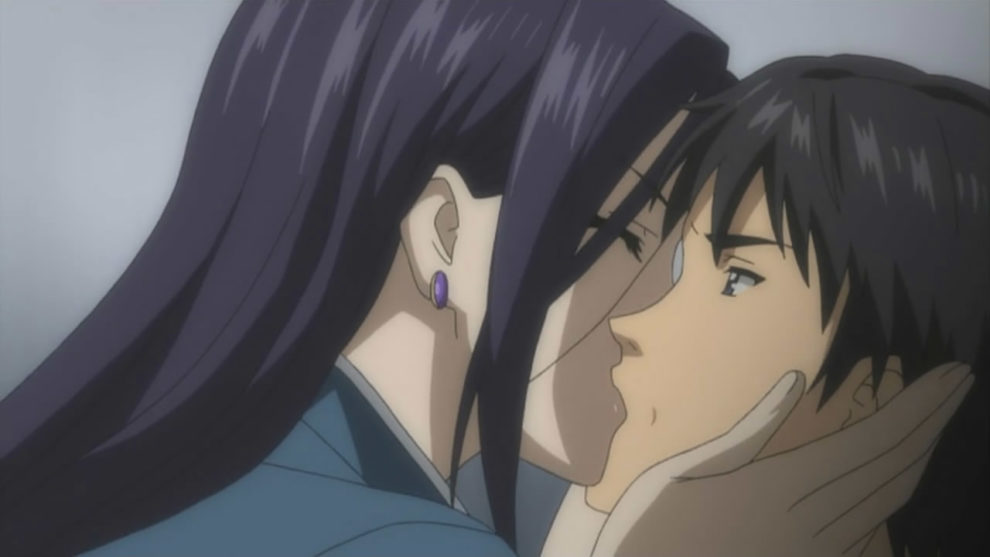Based on a light novel, “White Album” definitely falls under the “harem” category, but is also so much more, particularly in its presentation of rather complicated relations and the realities of pop idols.
Buy This Title
Touya Fujii, a college student, is dating a girl named Yuki Morikawa, who has just become an idol singer. Their relationship is put under intense strain immediately, while the people who surround the two seem to have agendas of their own, not only regarding their own lives, but also their relationships with the two.
Misaki is a friend of Touya's who is working as costume designer for a school troupe. The fact that she turned down the one in charge when he wanted to date her has resulted in a series of events that can only be described as bullying, with her turning to Touya for support, and eventually to his father for a place to work. However, his relationship with his father is rather strained, a concept that is a significant issue for him, since he can count to no family support, a fact that has led him to work in a coffee shop and as a tutor. Misaki also hangs a lot with Akira, Touya's classmate and best friend, but also one who is always eager to criticize him for his ways, in a way that makes him function like his friend's consciousness, but in an annoying way. Akira seems to be in love with Misaki, who has a thing for Touya though, despite the fact that she knows he is set for Yuki.
Haruka is Touya's childhood friend, and a former tennis prodigy who suffered an accident and had to give up on her career. She also seems to have a thing for the protagonist, who treats her really bad though, at least most of the time. Eventually she forms a relationship with Mana, a young girl Touya happened upon a train station, ending up tutoring her. Mana is the main source of comedy here, since she does not believe that Touya has a relationship with Yuki, and grinds both him and the people around him about it.
Rina is Yuki's mentor and best friend, an already quite famous idol, whose brother is also in charge of running the group. In a move that supposedly aims to help the couple be closer, she hires Touya as her manager, but her plan does not work in the end, particularly since the group's management does not want the girls to have relationships, essentially forcing Touya away from Misaki, without letting her know though. The medium of this approach is Yayoi, a beautiful but rather cold and manipulative woman, who is even offers herself to Touya to leave Misaki alone. As time passes and a concert, that is also a competition with another group, approaches, all the relationships face even more strain.

There are two elements here that make the narrative annoying. The first one is that Aquaplus, Akira Yoshimura, and Hiroaki Satou, who is in charge of the series composition, seem to assume that the people who watch the anime have already read the novel. This leaves a large part of the background of the characters and their relationships in the dark or even completely unexplored, which faults both the characterization and the story.
The second is that none of the characters is particular likeable, perhaps with the exception of Misaki, whose interaction with Touya and Akira however, are not exactly ideal. In that fashion, Yuki seems too naive about what is going on around her, and essentially unable to have an effect on her environment, Rina seems helpful but has an agenda of her own, Yayoi emerges as a manipulative whore, and Haruka seems to be constantly on the verge of tears. Touya, on the other hand, emerges as a mysterious character, that gets played by some of the female characters here, while “playing” others, even if occasionally not consciously. This aspect regarding the characters, who are either manipulative or victimized due to their lack of resolve, makes the bulk of them rather unlikeable.

On the other hand, these are also the elements that make the relationships and the story so intriguing, since all of the characters emerge as at least partially enigmatic, and in some weird way, realistic in that none of them is perfect. Furthermore, the concept of the idol and all the harshness involved in an industry that is quite huge in Japan is presented in all its rather dark glory, with the politics involved highlighting the fact that music is just a small aspect of the whole thing. The upcoming concert battle, which takes up the last part of the season, showcases the fact rather eloquently, as does the way the management tries to prevent the girls from having relationships, because something like that would deter fans. Misaki's arc intensifies and broadens the comment, by depicting it in the concept of theater, with the entertainment industry in general being rather harshly critiqued. Lastly, this aspect also affects directly the central theme of the series, of if a relationship between a regular college student and an idol singer can actually survive the potential difficulties both face.
Another interesting aspect of the narrative is the erotic one, which is presented quite realistically here, essentially becoming a factor of the story, although its depiction is more implied than depicted. Considering the fan service rules that were dominating the industry at the time, the approach here emerges as refreshing.
Hiroaki Satou's work in the creation of the characters is one of the best parts of the narrative, with him designing a number of individuals that differ significantly from each other, while their appearance actually fits their personality, with the same applying to their voices. The animation by Aquaplus focuses on realism, since there are no action scenes here, and in that regard, is fitting to the overall aesthetics. Furthermore, the whole title seems to have aged nicely, despite that, in terms of visuals, there is nothing extravagant here.
“White Album Season 1” has a number of faults, particularly regarding its protagonists, but in the end, emerges as a rather intriguing, and a quite easy to watch anime, through a rather addictive annoyance.

















